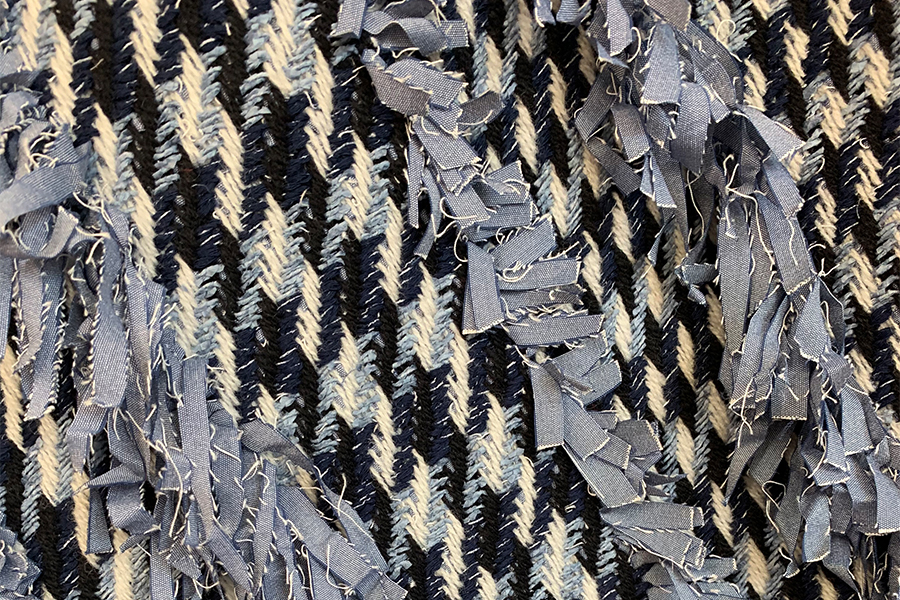 Japan House London Launches Exhibition of Critically Acclaimed Textile Designer SudÅ Reiko
Japan House London Launches Exhibition of Critically Acclaimed Textile Designer SudÅ Reiko
MAKING NUNO Japanese Textile Innovation from SudŠReiko is a brand-new exhibition adaptation presenting work by internationally acclaimed Japanese textile designer SudŠReiko with projection installations designed by the exhibition’s artistic director, SaitŠSeiichi of Panoramatiks (formerly Rhizomatiks Architecture).
Produced in collaboration with CHAT (Centre for Heritage, Arts and Textile) in Hong Kong, the exhibition expands on the successful show in 2019 curated by Takahashi Mizuki, Executive Director and Chief Curator of CHAT.
The free exhibition reveals how SudŠReiko’s work pushes the boundaries of textile production with unconventional and sustainable materials and engineering techniques, working with manufacturers from across Japan
 Featuring five large-scale installations combining NUNO textiles and art projections by leading technological designers Panoramatiks from Tokyo, shown for the first time in the UK, with supporting drawings and sketches, raw materials, design prototypes, and video.
Featuring five large-scale installations combining NUNO textiles and art projections by leading technological designers Panoramatiks from Tokyo, shown for the first time in the UK, with supporting drawings and sketches, raw materials, design prototypes, and video.
Launches Monday 17 May 2021
Japan House London presents an exhibition showcasing the innovative work of textile designer SudŠReiko. Running from 17 May ‒ 11 July 2021, this new exhibition, with art direction by SaitŠSeiichi of Panoramatiks (formerly Rhizomatiks Architecture), shines a spotlight on the Japanese designer pushing the boundaries of textile production and championing new methods of sustainable manufacture.
Design Director of leading textile design firm NUNO for over 30 years, SudÅ trained as a textile and industrial designer, and she designs fabrics that incorporate traditions of Japanese crafts with new engineering techniques and unusual combinations of materials. She works with materials as diverse as silk, hand-made washi (Japanese paper) nylon tape and thermoplastic, and technologies derived from Japanese hand craft traditions such as caustic burning, weaving and dying. Her inspiring designs are currently housed in collections around the world, including in MoMA in New York and in the V&A in London.
The exhibition at Japan House London includes five large-scale installations of SudÅ’s work with the manufacturing processes brought to life by SaitÅ Seiichi’s artistic direction. Using a variety of thought-provoking processes from washi dyeing to chemical lace embroidery inspired by rolls of paper, each installation is accompanied by drawings and sketches, alongside raw materials and design prototypes.
Visitors to the exhibition encounter a series of installations that demonstrates the ways in which SudÅ uses innovation and creativity to make steps towards building a more sustainable global textile production industry, with particular focus on the sustainability of materials, regional manufacturing industries and craftsmanship.
 Sustainability of Material:
Sustainability of Material:
Explore how SudÅ harnesses unconventional materials such as washi alongside textile techniques such as heating and bonding to create entirely original works.
Not to be missed, Kibiso Crisscross, a collaborative project with the Tsuruoka Textile Makers Cooperative, takes discarded kibiso, the protective outer layer of silk cocoons and uses a specially developed machine to create yarns from the tough remnants, creating the first step towards realising the ‘no-waste, use everything potential’ not previously seen in the silk industry.
Sustainability of Regional Manufacturing
Explore the origins of SudÅ’s work, following her decades of work with family-run factories across Japan which specialise in different production techniques, collaborating with each to develop new, alternative production methods to push the possibilities of industrial machinery making and help revitalise these regional manufacturing hubs.
Sustainability of Traditions and Craftsmanship
Discover SudÅ’s designs that revive old textile machines and Japanese craftsmanship on the verge of disappearing. Learn how she incorporates intricate craftsmanship into industrial textile production, collaborating with different experts and artisans along the way to help preserve craft heritage through upcycling and reinvention.
SudÅ Reiko, Textile Designer and Design Director of NUNO:
“Japanese textiles are born of a long history, embracing both refined traditions of artistry and unparalleled high-tech materials. Since 1984, Nuno has collaborated with skilled local artisans all over Japan using a wide variety of different fibres and techniques to craft some 3000 different textiles. Among these are the richly textured maku partitions to be displayed in the centre of Japan House London’s ground floor. Much more than a mere ‘curtain’, these textiles afford entry into a visionary realm with a uniquely Japanese essence. Please step inside and be transported into our weaving wonderland.â€
Continue reading →
 This post features two new weaving loom developments. The vLoom is a prototype and The Oxford Frame Loom is available now
This post features two new weaving loom developments. The vLoom is a prototype and The Oxford Frame Loom is available now












